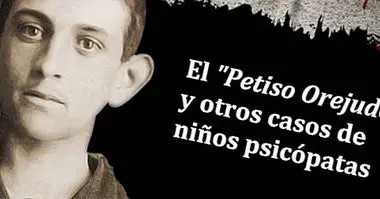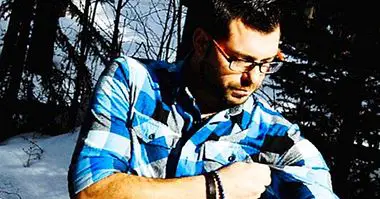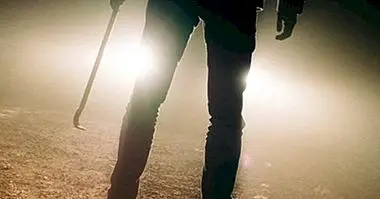Victimology: what is it and what is its object of study?
"28-year-old woman found dead in her house. Her husband called the police forces shortly afterwards in order to confess his murder, and then shot himself in the head with a gun. "
This type of news, unfortunately, are published or issued with some frequency by the media before the commission of a crime. When such acts occur, the police and justice services act, investigating what happened and taking into account a wide variety of knowledge when determining what could have happened and why it happened, based on the evidence.
The science that deals with studying crime and its causes, the ways to avoid it and the way to act with criminals is criminology. However, there is an essential element that does not appear among the previous ... Where is the victim? There is a discipline, currently inserted within criminology, that is responsible for its study: victimology .
What is victimology?
Coined by the psychiatrist Fredric Wertham , this term refers to the scientific discipline derived from criminology that studies the victims of crime in the various phases of victimization.
The creation of this discipline has allowed both the study and treatment of victims and relatives of all types of crimes, which traditional criminology ignored to focus on the figure of the offender. It is a relatively young scientific discipline, being its scientific beginnings in the thirties.
This discipline has numerous variants that have been focusing their attention on different aspects and having different interpretations of reality. But nevertheless, all the theories and perspectives have in common their study objective .
It can be said that, somehow, victimology focuses precisely on people who are in a greater situation of vulnerability and, therefore, are the first to need to study the type of experiences they go through, your sources of discomfort and possible solutions.
Subject of study of victimology
The main object of study of this discipline is the victim and its characteristics , as well as its relation with the delinquent and its role within the criminal situation.
Specifically, the set of factors that cause the person to become a victim is analyzed, whether the situation has been caused by a second person or due to the action or chance itself (such as an accident at work, for example), the relationship between facts with the current law and the possible repair of damages and the relationship between the aspects that can cause a person to be a victim and the occurrence of the crime.
What is a victim?
To better understand this object of study, it is necessary to define what is meant by the victim. According to resolution 40/34 of 1985 of the UN General Assembly, it is understood as such the subject / s that have suffered physical, psychological or emotional damage, or an attack and diminution of their fundamental rights as a consequence of actions or omissions that violate the legislation.
In the same way, his relatives or persons who have suffered damages for assisting the victim will also be considered as such .
Thus, it is understood that the damage experienced by the victims is not an isolated phenomenon that only affects individually, but that the sufferer is inserted in a social fabric through which discomfort is transmitted and the deterioration of the quality of life.
Methodology
As a scientific discipline, victimology has always been placed in an empiricist position , making inductive hypotheses from the observed cases. In this way, it requires surveys and observations of cases and victims in order to develop valid hypotheses that can help explain victimization processes.
Biopsychosocial elements, relationship with the subject that commits the crime and crime are fundamental clues in order to elaborate a consistent study of the victim and his situation in the crime. However, this science must take into account both the need for its immediate use and that of resembling other natural and social sciences.
The techniques used are the observation of reality, the study and analysis of cases and statistics, interviews and techniques from other sciences such as psychology, medicine, history, economics or computing, among others.
The main mechanism by which victimology can act is through the reporting of a crime, together with the testimony of those affected.Even the absence of these elements is an important source of information, given that the position of the various social groups and individuals regarding the system is reflected.
Types of victims
As a science that studies the victims of criminal offenses, numerous authors have made various classifications on typologies of victims.
One of them is the Jiménez de Asúa , who divides the victims into:
1. Determined victim
It is considered as such that which is chosen voluntarily by the criminal l , not being your choice due to chance. An example would be crimes of passion, revenge or crimes carried out by relatives or relatives.
2. Indifferent victim
Randomly chosen . The crime could be carried out with any other person without causing any change in the criminal. An example of this could be fraud or scams, like trileros. It is also observed in some criminal acts carried out by psychopaths and serial killers.
3. Resistant victim
That victim who is capable of resisting and defending herself , or that is attacked because of or knowing that the subject was going to defend himself.
4. Coadjutant victim
Not always there is a situation in which a subject is a victim of a crime this is a subject without connection to the criminal act. In this way, there are victims who actively participate in the crime, although it is possible to act under duress .
Role in the protection of the victim
Apart from studying the victim and the process through which he has become such, victimology also has a very prominent role in the aftermath of crime .
Specifically, its scope of study allows the creation of services to victims, contributing together with psychologists and other professionals to prepare assistance programs , such as the creation of crisis centers, official protection floors, witness protection programs. Likewise, the information and support provided to the victims are in general the most important services.
On the other hand, efforts are also made to prevent the dynamics of personal relationships that often lead to the appearance of victims. In this way, victimology is in contact with many branches of psychology and forensic science.
Ethical precaution
As a science that establishes close contact with victims of crime, victimology must have special caution in the procedures used when exercising your activity . It must be borne in mind that the victim of a crime, in addition to suffering crime per se, is subjected to the stress and tension produced by the investigation process (also reliving the event, often traumatic), and then dealing with the consequences (physical, psychological, social or work) produced by the crime.
In this sense, victimology has to try not to cause, with its application in practice, not causing secondary and / or tertiary victimization, that is, it must seek to prevent the victim from being harmed by the mere fact of relating, repeating or reliving traumatic experiences, both institutionally and socially.
Bibliographic references:
- Fattah, E.A. (2000). Victimology: Past, Present and Future. Criminology, vol. 33, 1. p.17-46
- Gulotta, G. (1976). The vittima. Milano, Italy. Editore Guiffré
- Jiménez, L. (1961). The so-called victimology. In Criminal Law and Criminology Studies, I. Buenos Aires, Argentina: Bibliográfica Omeba
- Langton, L. (2014). Socio-emotional impact of violent crime. Washington: Bureau of Justice Statistics.
- Lauritsen, J.L. (2010). Advances and Challenges in Empirical Studies on Victimization, Journal of Quantitative Criminology 26: 501-508.
- Márquez, A.E. (2011). Victimology as a study. Rediscovery of the victim for the criminal process. Prolegómenos Magazine. Rights and Values. Bogotá Vol. XIV, 27.
- Marshall, L. E. & Marshall, W.L. (2011). Empathy and Antisocial Behavior, Journal of Forensic Psychiatry & Psychology 22, 5: 742-759.
- McDonald, W. (1976). Towards a bicentennial revolution in criminal justice: the return of the victim, The American Criminal Law Review 13: 649-673.
- Neuman, E. (1994). The role of the victim in conventional and unconventional crimes, 2nd ed: Buenos Aires: University.
- Varona, G .; de la Cuesta, J.L .; Mayordomo, V. and Pérez, A.I. (2015) Victimology. An approach through its fundamental concepts as tools of understanding and intervention.



















